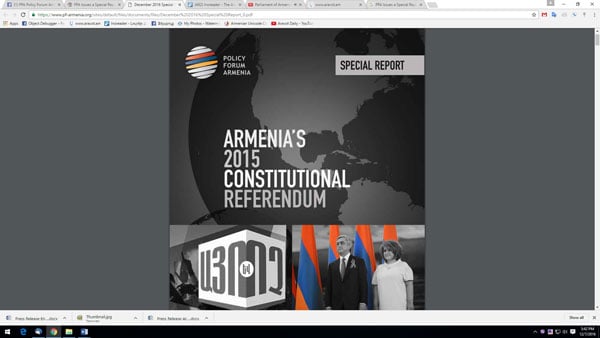December 6, 2016 marks the first anniversary of the 2015 Constitutional Referendum in Armenia. On that date, citizens of Armenia went to the polling stations to express their views on constitutional amendments proposed by the executive branch, aimed at transforming the country’s governance structure from a presidential to a parliamentary system.
The referendum was seen by critics as an avenue for perpetuating the rule of Serge Sargsyan—who occupies the president’s office following two fraudulent elections and cannot run for a third term—by making him Prime Minister with stronger powers for an indefinite period. Sargsyan’s rule since 2008 has been marred by an unprecedented degree of systemic corruption, cronyism, and poor economic/developmental decision-making, providing ground for skepticism toward the constitutional reforms package spearheaded by him.
Policy Forum Armenia’s Special Report “Armenia’s 2015 Constitutional Referendum” issued today provides evidence of systemic election fraud that took place on December 6, 2015. Specifically, it provides detailed statistical and econometric evidence, which can be summarized as follows:
• The officially reported voter turnout is unrealistically high and grossly misrepresents the reality on the ground.
• Statistical distribution of the Yes and No votes are highly abnormal. The distribution of the Yes vote is the most anomalous of any pro-government vote cast since 2008.
• Abnormally high voter turnout benefited the (pro-government) Yes vote.
• The (artificially inflated) voter turnout is correlated with factors that are highly susceptible to fraud.
• There exists a sizable and statistically significant “observer effect”, which indicates presence of fraud.
• The share of invalid ballots is correlated with the (pro-opposition) NO vote, suggesting strategic behavior and fraud.
International and local observers as well as numerous eyewitness accounts and social media reports support our empirical findings, that is, the presence of widespread irregularities and systemic fraud during the Referendum. The integrity of the process was clearly jeopardized and the final outcome did not express the will of people of Armenia.
Read also
As noted by PFA Executive Board member Dr. Zaven Kalayjian: “Based on the results provided in our report, the Constitutional amendments suggested by Sargsyan administration were in all likelihood rejected by the Armenian voters. Our analysis is consistent with other instances from Armenia’s recent history where the ruling regime has manipulated the polls for its own benefit.”
The report serves as a reminder of the degree and sophistication of election fraud in Armenia and a warning that a much stronger monitoring and recount efforts are needed to put a dent in the Sargsyan administration’s election fraud machine to influence an otherwise predictable outcome. While Armenia presents itself as an electoral democracy, the experience of the past quarter century has shown that conventional political mechanisms for change in Armenia are broken. Elections have merely become a tool of authoritarian power holders’ attempts to legitimize their rule. In this regard, PFA welcomes the recent statement by the US Embassy in Yerevan suggesting that the existence of electoral fraud in Armenia is “a matter of political will.”
The 4-day war in April and July events in Yerevan demonstrated that the social contract between the Sargsyan administration and people of Armenia is broken. While the population at large has endured substandard social conditions and human rights abuses as the price for peace in Artsakh and some economic growth, it has become clear that the Sargsyan administration is no longer capable of delivering on its part of the bargain. The events also showed that there exist political and societal forces in Armenia, who will go to great lengths to try to stop Armenia’s slide towards dictatorship and total control by Russia.
More than a new constitution Armenia needs a new breed of leaders with education, integrity, and vision, who could turn the existing laws into a workable mechanism for providing the good democratic governance required for the development, prosperity, and security of our homeland. The current status quo is unsustainable and will undoubtedly lead to new instability and social upheaval.
* * *
Policy Forum Armenia is a 501(c)3 non-profit think tank aimed at strengthening discourse on Armenia’s economic development and national security and, through that, helping to shape public policy in Armenia. This Special Report and other PFA reports, which provide assessments of critical developments taking place in Armenia and the Diaspora, are available via www.pf-armenia.org/reports.
PFA Executive Board
Washington, DC




















































